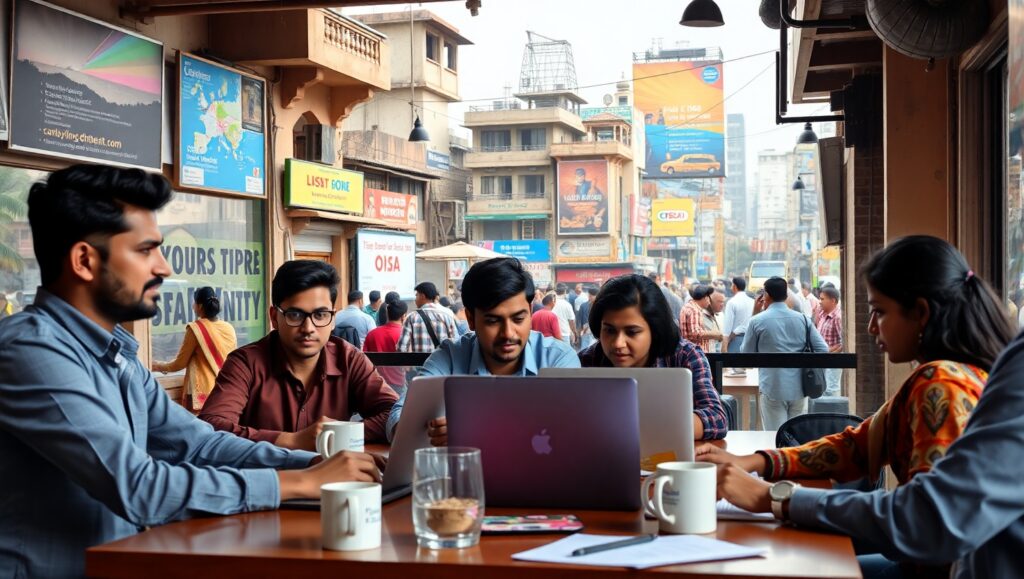India’s startup ecosystem has long been associated with metros like Bengaluru, Mumbai, Delhi, and Hyderabad. But in recent years, something amazing has been happening. Cities that were once overlooked—like Indore, Jaipur, Coimbatore, Kochi, and Surat—are now becoming vibrant centers for startups. These are called Tier-2 and Tier-3 cities. In this blog, we’ll explore why these cities are growing, what’s driving the change, and how they’re becoming powerful engines of entrepreneurship.
What Are Tier-2 and Tier-3 Cities?

- Tier-1 cities are India’s biggest, most developed metros.
- Tier-2 cities are smaller but growing fast—examples include Pune, Indore, Chandigarh.
- Tier-3 cities are even smaller—think of places like Meerut, Nashik, or Mysuru.
Earlier, most startups avoided Tier-2/3 cities because of lack of infrastructure or talent. But things are changing fast.
1. Affordable Living and Operating Costs
Startups burn money fast. In Tier-1 cities, office rent, employee salaries, and living expenses are high. Tier-2/3 cities offer everything at a lower cost—offices, co-working spaces, and even tech talent.
Why it matters:
- Startups can stretch their runway.
- Employees can enjoy better quality of life.
- Founders don’t have to worry as much about overhead.
2. Rising Local Talent
Engineering and business colleges are now spread across India. Cities like Bhopal, Bhubaneswar, and Nagpur are producing smart graduates who don’t want to move to metros.
Why it matters:
- Local talent reduces the need to hire from outside.
- Youth are eager to join startups rather than just MNCs.
3. Government Support and Infrastructure
The Indian government is pushing for entrepreneurship across all regions:
- Startup India scheme
- State-sponsored incubators
- City-specific programs like Kerala Startup Mission
Why it matters:
- Startups get grants, tax benefits, and mentorship.
- Public-private partnerships are building infrastructure.
4. Digital Penetration and Connectivity
Thanks to cheap internet and smartphone access, Tier-2/3 cities are now connected to the digital world. Services like Jio and UPI have changed how business is done.
Why it matters:
- Founders can build apps for local needs.
- Consumers from small cities are now online and spending.
5. Rise of Local Problems, Local Solutions
Startups from these cities are solving problems unique to their regions:
- Agriculture tech in Punjab
- Local delivery startups in Indore
- Regional language content platforms
Why it matters:
- These businesses have real demand.
- They understand their customer base better than outsiders.
6. Co-working Spaces and Startup Communities
Cities like Jaipur and Kochi now have co-working spaces, pitch events, and tech meetups.
Why it matters:
- Startups no longer feel isolated.
- A support system helps new founders take the leap.
7. Return of Talent to Hometowns
During and after the COVID-19 pandemic, many professionals returned to their hometowns. Some started companies locally instead of going back to big cities.
Why it matters:
- Experienced professionals bring knowledge and ideas.
- They invest time and money in growing local ecosystems.
8. Investor Interest Beyond Metros
Venture capitalists are now scouting for startups beyond metros. Companies in Surat, Lucknow, and Coimbatore have secured funding.
Why it matters:
- Access to capital is improving.
- Investors are realizing the potential in untapped markets.
9. Success Stories Are Inspiring More Startups
Success breeds success. When one startup makes it big, others get motivated.
Examples:
- CarDekho from Jaipur
- DailyHunt started in Bengaluru but works with Tier-2 content
- Inshorts grew by targeting mobile-first users
Why it matters:
- Role models inspire future entrepreneurs.
- Ecosystems become more confident.
10. Focus on Inclusion and Diversity
Startups from Tier-2/3 cities often include women, rural entrepreneurs, and marginalized groups.
Why it matters:
- Broader participation leads to balanced growth.
- Unique ideas come from diverse voices.
Conclusion
India’s Tier-2 and Tier-3 cities are no longer startup deserts. They’re becoming vibrant, self-sustained hubs full of energy, ideas, and innovation. With the right support and community, these cities can power the next wave of India’s economic growth.
The future of Indian startups isn’t just in big cities—it’s everywhere. Watch out for these rising stars from unexpected corners of the country!
Disclaimer:The content provided in this blog post is for informational purposes only. The opinions expressed here are those of the author and do not necessarily reflect the views or opinions of Business Rahi. While we strive to ensure the accuracy and reliability of the information presented, we cannot guarantee the completeness, reliability, or suitability of the content for any particular purpose. Any reliance you place on such information is strictly at your own risk.
Buisiness Rahi is not responsible for any losses or damages arising from the use of the information shared in this blog post. We may feature links to external websites, but these do not constitute endorsements or recommendations. We encourage readers to conduct their own research and consult with professionals before making any business decisions.
For more information about our brand or policies, please refer to our official website or contact us directly.

